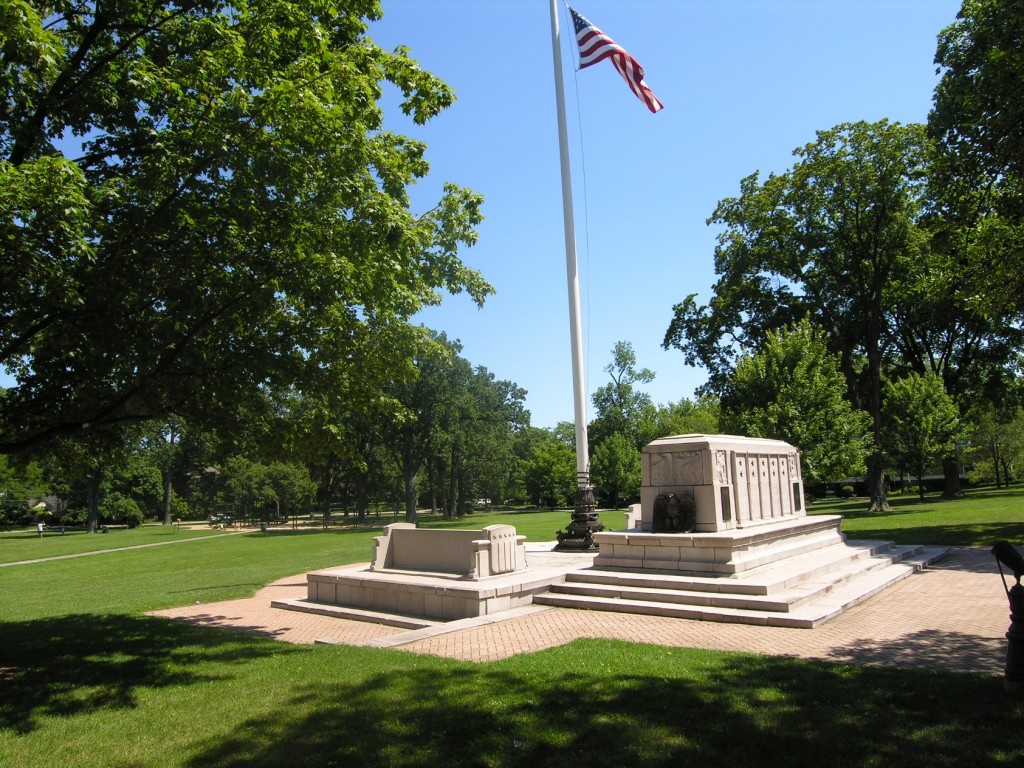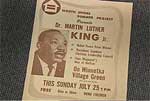The summer of 1965 — when I shook hands with Martin Luther King — was perhaps the most blissful period of my life. After Chicago, the trees of the North Shore liberated me. There were long narrow beaches beneath towering lakeside bluffs, the chilly water of Lake Michigan to dip in, and parks to walk in and to linger in writing poetry. In the cool summer evenings I liked to swoop along on my bike, inhaling the sweet rushing air, and with benign voyeurism savor glimpses of the varied lives enacted behind warm windows.
I went to see Dr. King that afternoon with Georgette and Pam, who were sisters, my first and best friends in Winnetka. We rode our bikes to the village green and sat on the grass in front of the war memorial, a block of marble about the size and shape of a minivan that stood at the center of the sward atop a rise of marble steps. We lounged and talked as other people began arriving and the lawn filled. After a time we noticed movement to the side of the memorial, people setting up chairs and amplification equipment.
Soon the lawn was quite crowded, the shadows of afternoon were stretching into evening, and our sense of anticipation grew. Dr. King would be late, an announcer told us, but had left his Chicago engagement and was on his way.
I recall it being a long wait. The lush summer twilight came over us and our expectancy grew and people talked in hushed voices so that they wouldn’t miss the next words from the public address system.
We began to receive updates: Dr. King’s car has crossed Howard street and is in Evanston. Dr. King’s car is on Green Bay Road. And at last there was a quickening of activity up to the left of the memorial, and we could see several heads moving through the welcoming committee.
I don’t remember much about the content of King’s talk except that it had to do with housing discrimination, but I do remember the thrill of hearing, in person, that grave oratorial cant, spoken and sung in the somber, implacable tones we are all familiar with now.
I claim that I am immune to charisma. I’ve always believed it grants demagogues and scoundrels persuasive power undeserved by either their intelligence or moral worth. It derives from a grotesque proclivity of the primate strain, a form of hysteria induced by proximity to a naked ape of higher status. I was born without that nerve, I say; I have met my share of potentates and celebrities, and have never been swayed.
But there’s one exception: I felt King’s charisma that evening. It was strong enough to reach out across the lawn and like a gravitational field embrace the crowd. Georgette and Pam and I listened for half an hour, almost oblivious to meaning, just suspended in the warmth of his rays and the rhythm of his words.
Then his talk was over and people clapped and Dr. King descended from the podium to become just a head again, moving among many other heads off to the side of the war memorial. Around us people folded their picnic blankets, and conversations turned from pressing social issues to dinner. I left the sisters and wove my way through the crowd and up toward the memorial, where a dense group had gathered near the entourage’s cars.
I don’t know if there was any formal hand-shaking event, just a slow-motion melee as Dr. King inched toward the cars through grateful hosts and eager local dignitaries. I wedged closer and then lost sight of him and then was startled to suddenly find myself only an arm’s length away.
My first impression was that he looked tired — a man with embers still glowing but banked now. A sense of physical density. Tolerant of his well-wishers but already preoccupied with whatever came next. Clustered near him were watchful black men in impeccable suits, with unsmiling, appraising eyes.
From this close, his charisma felt like a hot wood stove.
I was fourteen and in my adolescent solipsism, I hoped Dr. King would recognize me as a good person who embraced the same values. Surely he’d appreciate this special white kid whose heart was in the right place.
At some point, a signal must have passed through the entourage because suddenly it was time for King to disengage. He quickly shook some hands as he moved toward the cars, mine among them, a quick dry snatch and tug, the barest glance toward my face. I didn’t have time to say how much I admired him or to tell him what a kindred spirit I was. Car doors slammed, engines started. I went down the war memorial steps and across the depopulating park to look for my bicycle in the streetlamp twilight.
King was murdered three years later. I grew up, times changed. Bobby Kennedy, the Soviet menace, Nixon, Vietnam, Watergate . . . you know how the story goes. America striding and stumbling toward its destiny.
So what’s it worth, the recollection of a handshake? I can’t claim that his touch lingered like a brand upon my fingers and compelled to me great deeds. He didn’t notice me; there were millions of other kindred-spirit white teenagers out there; and I have acquired many other heroes.
Yet I still believe there’s something of value in the touch, skin to skin, bone to bone, of real people. Once there were people who could claim they’d shaken hands with Abraham Lincoln. Then they grew old and died and then there were no more living hands that had met Lincoln’s hands. The memory of a touch has meaning as the last link to the tangible, physical, mortal person.
Maybe the value of King’s handshake lies in the way a signal event provides a marker for memory, a starting place for self-reflection; recalling this now, I can feel the evening wind rushing at me as I glide along mid-summer twilight streets, and I know again how it felt to be fourteen and burgeoning in every part of my being.
Or maybe its merit lies in the confidence I had, pedaling home after shaking his hand, that what I’d always believed was, after all, true, that I was indeed on the right side of history. Maybe that affirmation is what he did best, why he moved us, and why we remember him.



